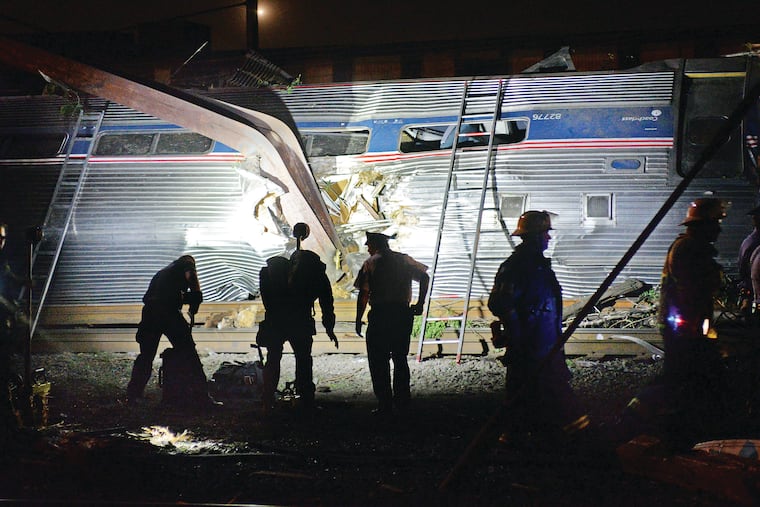Jurors will now decide if Amtrak engineer’s mistakes in 2015 crash were a crime
Brandon Bostian, who is charged with causing a catastrophe, eight counts of involuntary manslaughter, and nearly 250 counts of reckless endangerment, did not take the stand during his weeklong trial.

The case of Brandon Bostian, the Amtrak engineer operating Train 188 the night of a deadly May 2015 crash, now rests in the hands of a jury.
Bostian, who is charged with causing a catastrophe, eight counts of involuntary manslaughter, and nearly 250 counts of reckless endangerment, did not take the stand during his weeklong trial. Jurors heard closing arguments Thursday — where prosecutors contended Bostian was grossly negligent and the defense asserted he made an honest mistake — and they must now decide whether the error rises to the level of a crime.
The night of the crash, Bostian sped up to 106 mph as he approached a curve at Frankford Junction, which had a 50 mph limit. Eight people died in the derailment, one of the worst in recent U.S. history, and more than 200 people were injured.
A National Transportation Safety Board report found Bostian was not intoxicated, suffering from fatigue, or on his cell phone ahead of the derailment. The report also outlined six minutes of radio dispatches from a SEPTA engineer who made an emergency stop after their train’s windshield was shattered by a possible trespasser throwing a rock.
While the details of dispatches were not disputed, their effects were central in the defense led by Brian McMonagle. In his closing argument, McMonagle asked jurors: should Bostian be punished for a mistake caused by a distraction he didn’t create?
“Twenty-seven seconds from the last broadcast [Bostian] starts making mistakes,” McMonagle told jurors, circling back to the testimony of his final witness Timothy Hicks, of Illinois-based Professional Analysis and Consulting, Inc., a company that specializes in accident investigations and reconstructions.
Hicks testified that there was no evidence to support Bostian caused his own distraction. He also noted that colleagues and supervisors called Bostian a “top notch” engineer and “one of Amtrak’s best” in interviews.
Bostian, argued McMonagle, was not comparable to someone who takes a risk like texting and driving. McMonagle said the individuals throwing rocks at the SEPTA train and a second Acela train — not mentioned in the NTSB report — created the danger and distraction that led to the tragedy.
Leading the prosecution for the state Attorney General’s Office, Christopher Phillips painted a different picture, reminding jurors of the multiple engineers who took the witness stand and described how trains were often struck by projectiles.
Phillips told jurors the only reason Bostian could operate a train without a partner was by proving he could control the speed of the train, as well as the rules and route. That same training should have prepared him to navigate any projectiles being thrown, said Phillips.
“You’re judging an experienced engineer who is taught the dangers of the job and how to deal with them,” he said, adding passengers were counting on Bostian to do his job correctly.
Phillips told jurors Bostian knew the risk of accelerating past the speed limit in one of the most difficult sections of his route and negligently did so anyway.
The prosecution also cast doubt on the defense’s claims that Bostian didn’t know where he was in the lead up to the crash, pointing to conflicting statements Bostian gave a passenger at the crash site and investigators. The defense maintained memory loss was a side effect of the traumatic event and head injury Bostian suffered.
Thursday wrapped several days of testimony from witnesses that included the Amtrak engineer who trained Bostian, crash investigators, and an older brother of Robert Gildersleeve Jr., who died in the crash.
The trial punctuates years of a legal back and forth. In 2016, Amtrak agreed to pay a $265 million settlement to victims but it took years for Bostian to face trial.
The Philadelphia District Attorney’s Office initially declined to file charges against Bostian and when a judge ordered the office to do so, it recused itself, prompting the Attorney General’s Office to step in. Even so, two judges dismissed charges against Bostian, finding his actions weren’t criminal, with the prosecution successfully appealing the decisions.
Common Pleas Court Judge Barbara McDermott offered jury instructions Thursday afternoon, sending them home with plans for deliberations to begin Friday.
Bostian, who declined a plea deal before the start of the trial, could face years in prison if found guilty.